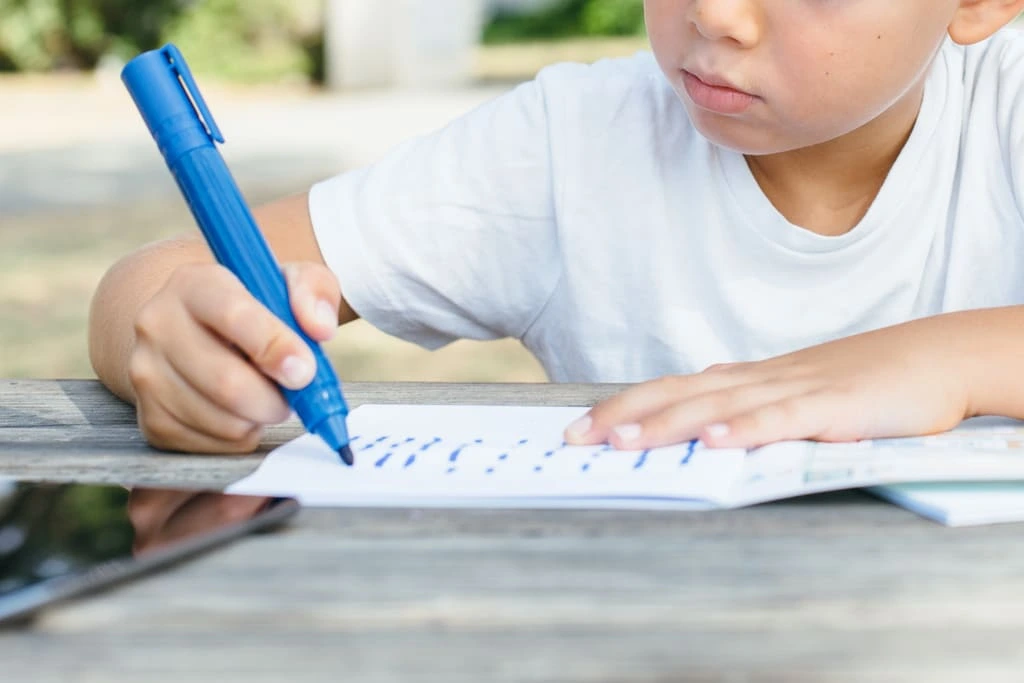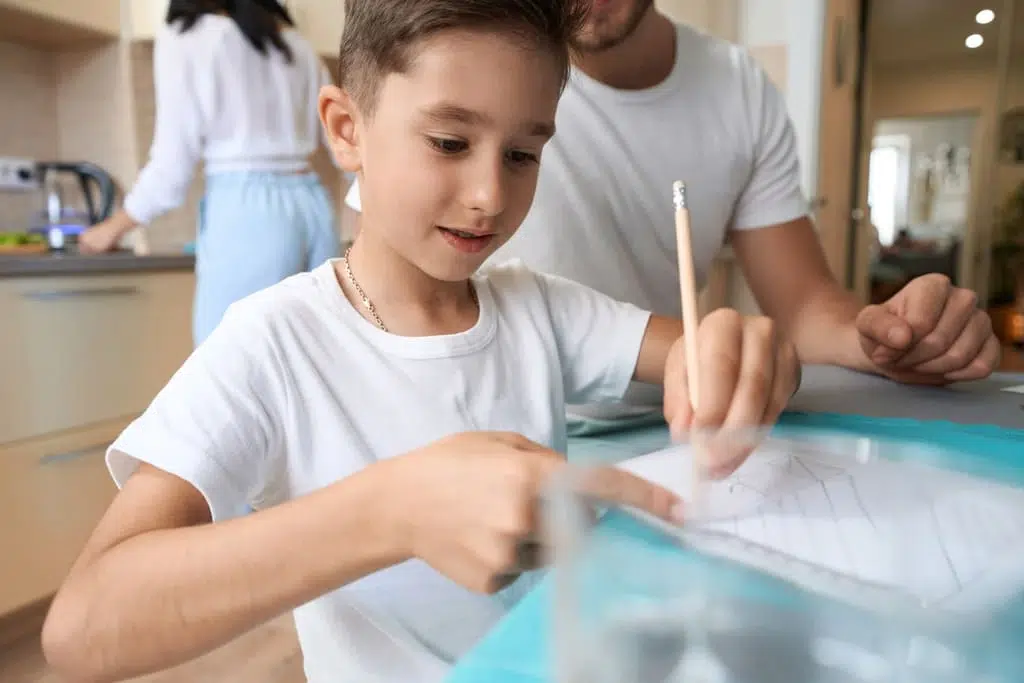Definition of Dysgraphia
The physical side of dysgraphia impacts a child’s fine motor skills, leading to challenges such as:
- An overly tight pencil grip
- Painful hand cramps due to writing fatigue
- Challenges with letter formation
- Difficulties with cursive writing
- Inconsistent letter size
- Incorrect spacing
The cognitive aspect of dysgraphia impacts a child’s ability to organise their thoughts on paper and leads to challenges such as:
- Difficulties with spelling, grammar, punctuation
- Disorganised writing
- Mental blocks
Like other learning difficulties, dysgraphia doesn’t affect a child’s overall intelligence or creativity. Accommodations should be made in schools, such as allowing children to use graph paper, which can be easier for children with dysgraphia to write with. With person-centred support, individuals with dysgraphia can thrive in their environment and improve their writing skills.
Tips and Strategies to Help a Child with Dysgraphia
There are many tips and strategies to help children with dysgraphia, but a strategy from an occupational therapist is recommended and can improve the child’s handwriting skills. A quality strategy is important for dealing with low self-esteem and enabling students with dysgraphia to excel at school. Parents, teachers, and home care workers also play a vital role in the child’s accommodation.
Below are some practical tips and strategies to help a child with dysgraphia.
Acknowledge the Difficulty and Talk to Your Child About It
First of all, parents should explain what dysgraphia is in a supportive way and let the child freely express their feelings about it. Make your child aware that their challenges are not a personal failure or a result of low intelligence. This approach can prevent self-esteem issues and significantly benefit the child’s mental well-being.
Practice Writing Big Letters
The improvement of fine motor skills is intrinsically linked to developing the child’s gross motor skills. Practising with big letters can help students with dysgraphia grasp the process of forming letters. Engaging children’s fingers in big actions will enable them to master small movements as well.

Practice Pinching to Strengthen Fingers
Dysgraphia causes writing fatigue and can lead to hand pain after a short period of writing. You can help your child flex their hands with pinching tools like tongs, tweezers, and chopsticks. Parents can also get children excited about learning by getting them to pick things up with these tools in various games. Developing a habit of properly gripping different items will help your child hold a pencil correctly.
Make Audio-Recordings
Written assignments are cognitively taxing tasks for individuals with dysgraphia. Children with this learning difficulty may find it harder to receive information during a lesson and write it down at the same time. Instead of traditional methods (such as copying text from the board), students with dysgraphia can utilise an audio recorder. With an audio recording device, they can record their teacher, listen to their input, and complete the written task at their own pace.
Type on a Computer Keyboard
Unlike handwriting, typing on a computer keyboard eliminates several elements that a child may face challenges with, such as letter formation, writing along a straight line and word spacing. As a modern writing tool, computers provide quick correction of spelling mistakes, which can help children with their writing process. Furthermore, touch typing activates the muscle memory in your hands and therefore helps you develop various writing skills, such as spelling.
Spelling out Loud
While dysgraphia can impact a person’s ability to spell correctly on paper, it doesn’t affect the ability to spell out loud. Therefore, teachers should allow students with dysgraphia to complete written assignments verbally. For example, they can take part in writing assignments like spelling tests verbally instead of using writing paper.
Get Help From a Trained Support Worker
Even with the advanced technology available today, a child can still benefit from personalised support from a trained support worker. Getting help from a trained support worker can significantly improve your child’s well-being and written skills. Leaf Complex Care offers comprehensive dysgraphia support services that are tailored to individual needs.
Fun Activities That Help Children with Dysgraphia
Parents can help their children overcome writing challenges linked to dysgraphia through various fun activities at home. Below are some great ideas that you can consider to help your child.

Memory Games
Memory games are a good way to sharpen your child’s writing skills. For example, you can ask your child to memorise a list of animals, the colours of cars you pass during a family road trip, or the ingredients of meals you prepare. You can ask your child to verbally recite what they remember and write down this list together, improving the child’s writing process.
Dictation
Dictation exercises can be a fun and helpful tool for developing your child’s decoding and handwriting skills. You can start the exercise by reading an individual letter aloud and asking your child to write it down, then move on to spelling out gradually longer words. Once they have practised writing down letters and words, you can have them take notes or compile a list of fun things that you would later dictate.
Maze Games with Pen and Paper
Completing a maze requires excellent fine motor control, which makes maze games beneficial for practising strength and control of the child’s fine motor skills. In order to reach the end of the maze, the player should keep their pencil or pen within the lines. This is a fun and effective way to improve your child’s coordination.
Clay Modelling
Dysgraphia impacts your child’s finger strength and agility, which play a vital role in handwriting. Clay modelling can strengthen the child’s finger muscles and improve their fine motor skills. Consequently, this game can help the child develop a proper pen or pencil grip.
How Leaf Complex Care Can Support Children with Dysgraphia
At Leaf Complex Care, we aim to improve the written expression of children with dysgraphia in a humanised, person-centred manner. Our support workers work closely with the whole family and experts to create quality learning strategies and physical exercises to improve writing skills.
We offer high-standard care services for children with dysgraphia in their own homes, with the support of their loved ones. Our support workers employ up-to-date assistive devices and strategies to accommodate students with dysgraphia, and we tailor each approach to individual needs.
Leaf Complex Care offers CQC-regulated care services, and our offices are in Bristol, Somerset, Slough, and the Midlands. Contact us today, and we will create a tailored strategy according to your needs.


















